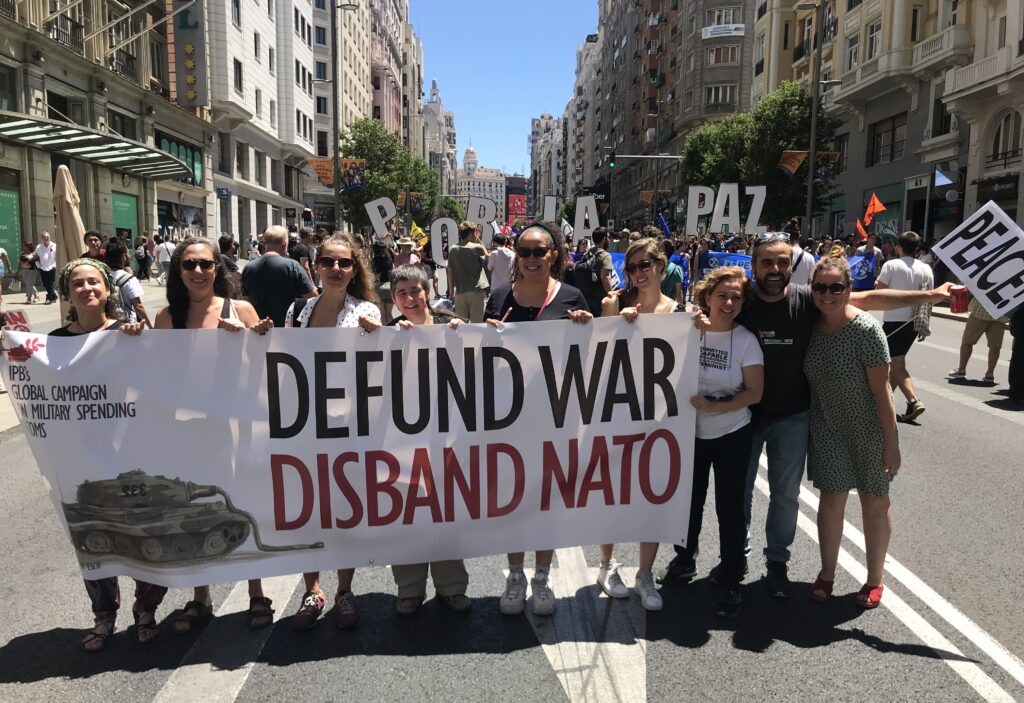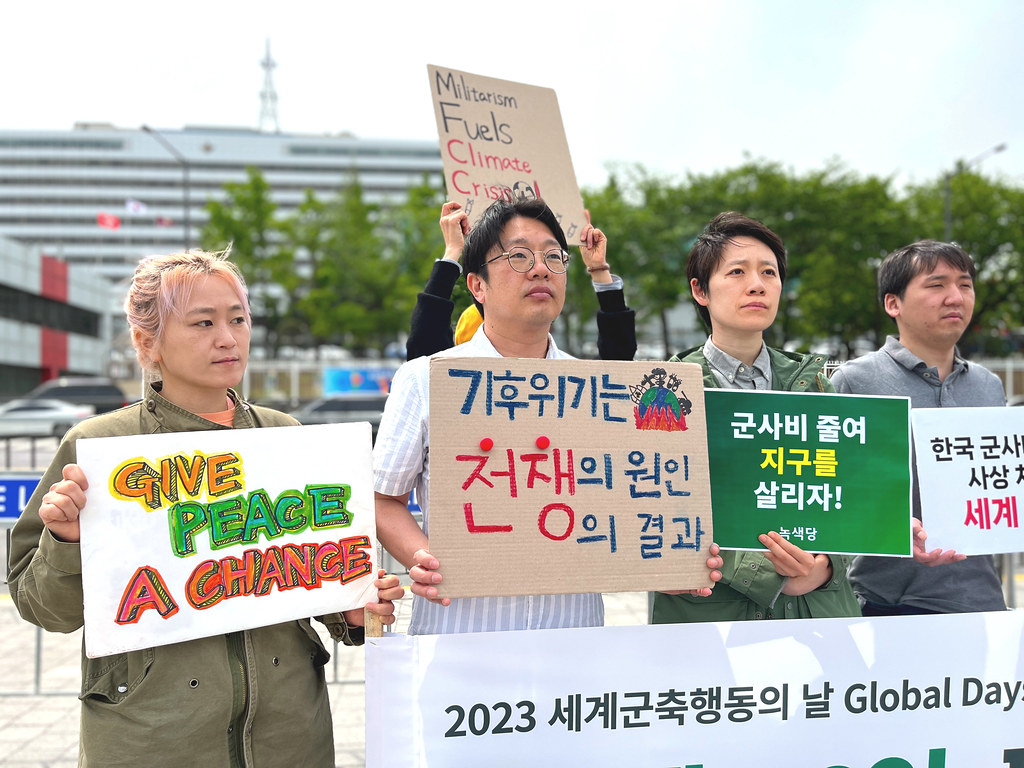About us
The Global Campaign on Military Spending (GCOMS) is a year-round international campaign founded in December 2014 and promoted by the International Peace Bureau after the success of the Global Days of Action (GDAMS), that have been an annual occurrence since 2011. The main goal of the campaign is to raise awareness and change the discourse regarding military spending as a means to achieve major reductions of military expenditures all around the world.
Our growing community intends to impact at the budget decision-making, especially at the national level, so that resources are reallocated to actual human and environmental needs.
Who we are
The Global Campaign On Military Spending works through the cooperative efforts of its members. So far more than 100 organizations from 35 different countries have joined the campaign, working within their particular contexts to raise awareness and change government policy and practice on military spending.
GCOMS is run by a steering group of peace activists from all over the world, coordinated by the Centre Delàs of Peace Studies in Barcelona (Spain), which works as a decentralized office of the International Peace Bureau.
The International Peace Bureau (IPB) was founded in 1891 and it is the world’s oldest and largest international peace federation. It is dedicated to the vision of a World Without War. Our current main programme focuses on Disarmament for Sustainable Development and within this mainly on the reallocation of military expenditure. At the same time, we support several disarmament campaigns and provide data on the economic dimensions of weapons and conflicts. Our 300 member organisations in 70 different countries, together with individual members, form a global network that brings together knowledge and campaigning experience for a common cause.
IPB was awarded the Nobel Peace Prize in 1910 “for acting as a link between the peace societies of the various countries”. As of 2019, thirteen other Nobel Peace Prizes have been awarded to members of the IPB. The headquarters of the IPB is in Berlin and it has two decentralized offices in Geneva and Barcelona.
Centre Delàs of Peace Studies is a research centre dedicated to peace and disarmament, with a particular interest in military expenditure. The mission of the Centre is to strengthen the culture of peace and to impulse the construction of a disarmed society. Centre Delàs combines research with divulgation and social mobilization against the devastating effects of arms and militarism. It collaborates with the Stockholm International Peace Research Institute (SIPRI) and it is a member of ENAAT (European Network Against Arms Trade) and AIPAZ (Spanish Association of Peace Research).
Staff team

Coordinator
@jordicalvo

Officer

Research and campaign
consultant (volunteer)

Research and database (volunteer)
Consultants
Pere Ortega, Researcher on Military Spending, Centre Delàs of Peace Studies
Colin Archer, Former IPB secretary general.
Arielle Denis, IPB Consultant, Geneva office.
International Steering Group
- Alex Harang, Norway, Norges Fredslag
- Angelo Cardona, IPB Youth Network
- Amela Skiljan, Germany, International Peace Bureau
- Chloé Meulewaeter, Centre Delàs of Peace Studies
- Corazon Fabros, Philippines, Stop the War! Coalition
- Cyrille Rolande, Cameroon, Noveaux Droits de l’Homme
- Dave Webb, UK, Campaign for Nuclear Disarmament (CND)
- Denis Doherty, Australia, Independent and Peaceful Australia Network (IPAN)
- Edwina Hughes, New Zealand, Peace Movement Aotearoa
- Francesco Vignarca, Italy, Rete Italiana Pace e Disarmo
- Jordi Calvo, Spain, Centre Delàs of Peace Studies / IPB Barcelona
- Joseph Gerson, U.S.A., Campaign for Peace, Disarmament and Common Security
- Luke Addison, UK, Peace Jam
- Moses Adedeji, Nigeria, Trees on earth Nigeria
- Nathalie Gauchet, France, Mouvement de la Paix
- Panos Trigazis, Greece, Observatory of International Organizations and Globalization (PADOP)
- Pere Brunet, Spain, Centre Delàs of Peace Studies
- Philip Jennings, IPB Co-President
- Quique Sánchez, Spain, IPB Barcelona / Centre Delàs of Peace Studies
- Reiner Braun, Germany, IPB Executive Director
- Karen Hallows and Rika Watanabe, Japan, Peace Boat
- Sean Conner, Germany, International Peace Bureau
- Tori Bateman, U.S.A., American Friends Service Committee
- Lee Youngah, S. Korea, People’s Solidarity for Participatory Democracy
GCOMS U.S. / GCOMS UK / GCOMS NZ



Members
- Acción Colectiva de Objetores y Objetoras de Conciencia
- Action des Citoyens pour le Désarmement Nucleaire
- African Hungarian Union
- Agir Pour La Paix
- Alianza Social Continental
- ALTERNATIVA ANTIMILITARISTA-MOC
- American Friends Service Committee
- Andalusian Association for Human Rights (APDHA)
- APRED Participative Institute for the Progress of Peace
- Asamblea Antimilitarista
- Association Suisse Birmanie
- Australian Peace Committee
- Auckland Peace Action
- Austin Conscientious Objectors to Military Taxation
- Bake-Ekintza Antimilitarista Taldea
- Basel Peace Office
- Beati I Construttori di Pace
- Better World Info
- Bunge la Mwananchi
- Campaign Against Arms Trade
- Campaign for Nuclear Disarmament
- Canadian Voice of Women for Peace
- Catalan Federation of Organizations for Global Justice – LaFede
- Center for Bangladesh Studies
- Center of Feminist Foreign Policy
- Centre for Peace and Conflict Studies
- Centre Delàs d’Estudis per la Pau
- Ceasefire.ca
- ChangeMaker – Society for Social and Economic Development
- Church Center for the United Nations
- Coalition for Constitution Implementation
- CODEPINK: Women for Peace
- Community Alliance of Lane County
- Conscience and Peace Tax International
- Conscience Canada
- Control Arms Foundation of India
- Desarma Madrid
- Campaign for Peace, Disarmament and Common Security
- European Bureau for Conscientious Objection (ECBO)
- Frauen fuer den Frieden Schweiz (Women for Peace Switzerland)
- FundiPau (Foundation for Peace)
- Global Campaign for Peace Education
- Global Days of Listening
- Global Network Against Weapons and Nuclear Power in Space
- Golden Bay Quackers
- Granny Peace Brigade Philadelphia
- Honolulu Friends Meeting
- Independent and Peaceful Australia Network (IPAN)
- Instituto de la Paz y los Conflictos (IPAZ)
- Instituto Latinoamericano por la Paz y la Ciudadanía -ILAPyC
- Inter Alia
- International Association Of Lawyers Against Nuclear Arms (IALANA)
- International Campaign to Abolish Nuclear Weapons (ICAN)
- International Network of Engineers and Scientists for Global Responsibility (INES)
- Insumissia
- Just Peace Queensland
- Kenya Pastoralist Journalist Network
- Maine War Tax Resistance Resource Center
- Manipur Women Gun Survivors Network
- Massachusetts Peace Action
- Massachusetts People’s Budget Campaign
- Mouvement de la Paix
- Marrickville Peace Group
- Milwaukee War Tax Resistance
- Mouvement Chrétien pour la Paix
- Mujeres por la Paz
- National Campaign to End the Korean War
- The National Network Opposing the Militarization of Youth (NNOMY)
- National Priorities Project
- National War Tax Resistance Coordinating Committee
- Netzwerk Friedenssteuer
- New Priorities Campaign (NPC)
- New Priorities Network
- Northern California War Tax Resistance / People’s Life Fund
- Norges Fredslag
- Norges Fredsrad
- Nouveaux Droits de l’Homme – Cameroun
- Nova Scotia Voice of Women for Peace
- Nuclear Age Peace Foundation
- Nuclear Resister
- Oak Ridge Environmental Peace Alliance
- Observatory of International Organizations and Globalization (PADOP)
- On Earth Peace
- Parliamentarians for Nuclear Nonproliferation and Disarmament for Nuclear Nonproliferation and Disarmament
- Pax Christi International
- Pax Christi New Orleans
- Pax Christi Wallonie Bruxelles
- Pacem in Terris / Peace on Earth
- Peace Action
- Peace Action Wellington
- Peace and Justice (former Edinburgh Peace & Justice Centre)
- Peace Boat
- Peacebus.com
- Peace Jam
- PeaceMajority Report
- Peace Movement Aotearoa
- PeaceNetwork
- Peace Resource Center of San Diego
- PeaceWorks
- People for Nuclear Disarmament
- People’s Solidarity for Participatory Democracy
- Pioneer Valley War Tax Resistance
- Prague vision
- Quakers in Nelson
- Rauhanliitto – Peace Union of Finland
- Reaching Critical Will
- Red Antimilitarista Noviolenta de Andalucia
- Rete Italiana Pace e Disarmo
- Rocky Mountain Peace & Justice Cente
- Rural Development and Youth Training Institute
- Sadankomitea
- School of the Americas Watch
- Science for Peace
- Servicio de Paz y Justicia en América Latina
- Stop Fuelling War (France)
- Stop the War! Coalition (Philippines)
- Strategic Concept for Removal of Arms and Proliferation
- Servicio Paz y Justicia (SERPAJ)
- Suaram
- Tipping Point North South
- Trees on Earth Development Foundation
- UNFOLD ZERO
- United for Peace & Justice
- Universitat Jaume I (UJI)
- USAction
- Vietnam Peace and Development Foundation
- Vrede.be
- Walpole Peace & Justice Group
- War Resisters’ International
- War Resisters League
- Win Without War
- Women Against War
- Women In Black
- Women’s Action for New Directions (WAND)
- Women’s International League for Peace and Freedom (WILPF)
- Women’s International League for Peace and Freedom (WILPF) – Australian Section
- Women’s International League for Peace and Freedom (WILPF) – Sierra Leone
- World Without Wars and Violence
To add your organisation’s name to the list of partners, please follow these instructions and write to us at: coordination.gcoms@ipb.org
Download the GCOMS Leaflet
Our history
In 2005 IPB launched its programme ‘Disarmament for Sustainable Development’ (D for D), which was designed to direct widespread, public concern to the ongoing high level of global military spending, and the evidence that all weapons – both the devastating weapons of mass destruction and those used on a frequent basis (small arms, cluster bombs, landmines, etc.) seriously impede sustainable development. Since several world conflicts over the previous decade demonstrated that military solutions were not useful in the attempt to establish peace throughout the world, IPB advocates for major reductions in defense budgets and the adoption of a ‘human security’ approach.
The Disarmament for Sustainable Development programme focuses on three thematic areas:
- military spending,
- impacts of weapons on development,
- justifications for investments in militarism.
One of the highlights of this programme is the Global Days of Action on Military Spending (GDAMS), which has been a yearly spring event since 2011. In December 2014 it was decided that the GDAMS would become the main event of a broader year-round campaign, the Global Campaign on Military Spending (GCOMS).
GDAMS actions would firstly take place during a day, and afterwards during a short period which would include the U.S. Tax Day and the yearly publication of data on worldwide military expenditure by the Stockholm International Peace Research Institute. We consider this timing is particularly convenient: during these days the biggest world military spender is collecting taxes and SIPRI is publishing its report and drawing lots of attention to the issue.
Within time new partnerships were formed and new issues were incorporated. In particular, the Climate Change agreement (COP 21) and the consecration of the Sustainable Development Goals (SDGs) by the UN General Assembly were given a considerable amount of focus over the past years. IPB and its GCOMS partners consistently supported the notion that much of the money locked into the military sector should and – given political will – could be made available for such purposes.
Since 2011, the central focus of the D for D program consists of military and social spending. The various concepts of these terms are discussed in greater detail in the book, Warfare or Welfare? as well as in a follow-up book, Whose Priorities?. Both books provide examples of creative campaigning by NGOs and other civil society organisations that have taken up these issues. More recent publications focus on the links between military spending and the Development Agenda of the United Nations, as well as the challenge of climate change.
By the end of 2015 it was becoming clear that a third area would also be requiring major investments: humanitarian crises. This issue was addressed in the May 2016 World Humanitarian Summit (WHS) in Istanbul.
A milestone for the D for D program was the International Conference “Disarm! For a Climate of Peace” held in Berlin in 2016. Organized by the International Peace Bureau, it brought together a wide variety of experts and advocates from all around the world, with over 1.000 participants from 58 different countries. 4 Nobel Peace Prize laureates participated in the conference.
In more recent years the campaign has put an special emphasis on climate emergencies, highlighting the opportunity cost of military spending and denouncing the connections between environmental destruction and militarization, which is both a cause of and a response to climate change.

